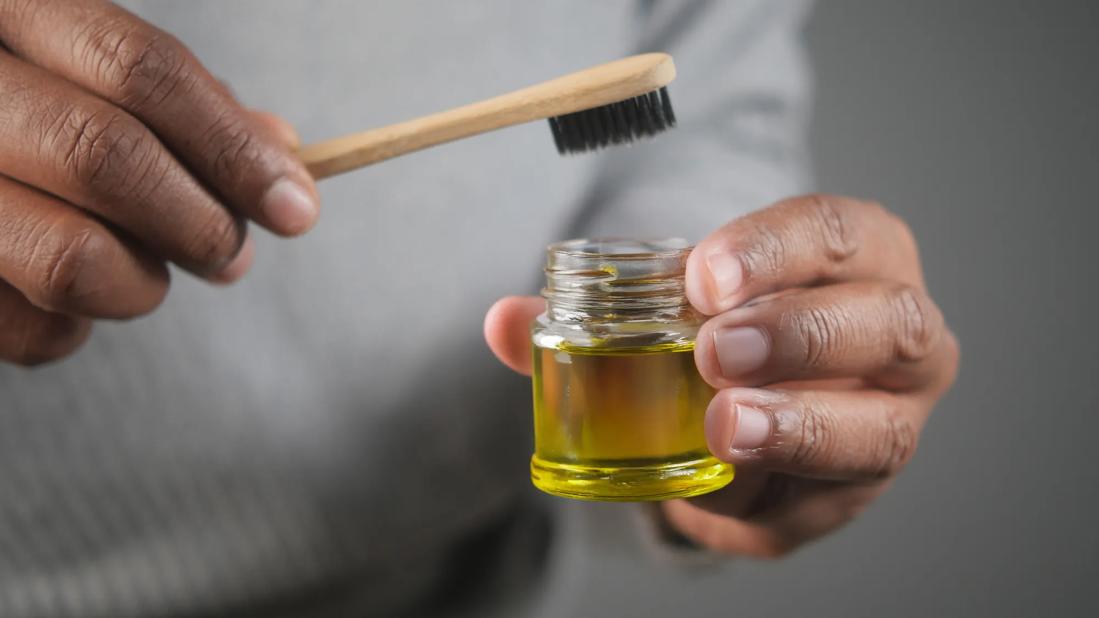This oral health practice doesn’t have proven benefits, and it’s not a substitute for brushing and flossing

Image content: This image is available to view online.
View image online (https://assets.clevelandclinic.org/transform/18ced559-4ae2-4324-8487-80c4f68a0d0e/oil-pulling-2208482621)
Person holding black-bristle toothbrush and jar or oil
Oil pulling is an ancient oral health remedy that has gained new popularity in holistic wellness circles. Some say swishing with coconut oil or other oils can fight cavities, reduce plaque and whiten teeth.
Advertisement
Cleveland Clinic is a non-profit academic medical center. Advertising on our site helps support our mission. We do not endorse non-Cleveland Clinic products or services. Policy
But can it really live up to these claims? (Spoiler: No).
Dentist Anne Clemons, DMD, gives us the lowdown.
“Oil pulling is when you put about a tablespoon of edible oil in your mouth and then swish it around for a certain period of time,” Dr. Clemons explains. “That amount of time can vary up to 20 minutes.”
After you’ve swished the oil around, you spit it out, brush your teeth and go about your day.
Modern-day proponents of oil pulling often use coconut oil, while the traditional Ayurvedic method leaned on sesame oil. Other edible oils, like sunflower oil or olive oil, are also options.
So, why do people do oil pulling? For centuries, people believed this practice could prevent tooth decay, bad breath, bleeding gums, dry throat and cracked lips. Today, enthusiastic proponents claim it can do all that and more.
But the evidence-based bottom line is this: Coconut oil pulling and other variations of oil pulling don’t appear to offer benefits — and they’re certainly not a substitute for regular brushing and flossing.
The American Dental Association (ADA) doesn’t recommend oil pulling in any form, citing a lack of scientific proof that it delivers on touted claims.
And though there are several studies on oil pulling, they’re small and don’t provide enough data to show the practice is beneficial when it comes to oral hygiene matters, such as:
Advertisement
“There’s no evidence that oil pulling is effective or that it will make any noticeable difference in oral health,” Dr. Clemons states.
Let’s start with a big claim: Oil pulling isn’t a proven remedy for cavities, as some advocates say. “You can’t fix a hole in your tooth using DIY home methods,” Dr. Clemons clarifies. “For that, you’ll need to see a dentist. There’s no other way.”
There’s also no clear evidence that oil pulling can:
“There is no research that supports any of these health claims,” she reiterates.
While there isn’t any conclusive evidence that oil pulling is beneficial, Dr. Clemons also notes that it hasn’t been found to be harmful. So, it’s OK to incorporate it into your overall oral hygiene routine — but only if it’s done with brushing and flossing.
If you want to give oil pulling a try, here’s how to do it:
If oil pulling makes you happy, pull away! It’s not going to hurt you. But there’s really no need. A bigger priority is brushing with fluoride toothpaste at least twice a day for two minutes, as well as flossing once or twice a day.
“These practices are the foundation of good dental hygiene,” Dr. Clemons says. “If you’re not flossing every day, establish that habit before turning to oil pulling as an add-on.”
Advertisement

Sign up for our Health Essentials emails for expert guidance on nutrition, fitness, sleep, skin care and more.
Learn more about our editorial process.
Advertisement
For fresher breath in the a.m., practice good oral hygiene, including flossing your teeth and scraping your tongue
These common mouth sores are very different — cold sores are caused by a virus and are contagious, but canker sores aren’t
This medicated liquid is available by prescription only and is specially formulated for your specific needs
Lots of things can activate the herpes simplex virus, from the common cold and cold weather to cracked skin and cosmetic procedures
Prescription oral antivirals are your best bet, but OTC creams can help, too
Stay hydrated, use a humidifier and try sugar-free candies or over-the-counter products with xylitol
Non-cancerous ulcers usually heal within a few days or weeks — if it’s sticking around, it’s time to get it checked
Get quick relief with ice chips, popsicles, milk and saltwater
Prioritize your health by managing stress, strengthening your social connections and getting quality sleep
Bolsters, blankets, pillows and blocks can offer extra support, stability and comfort
Allergies, postnasal drip, asthma or reflux could be to blame for a cough that won’t quit